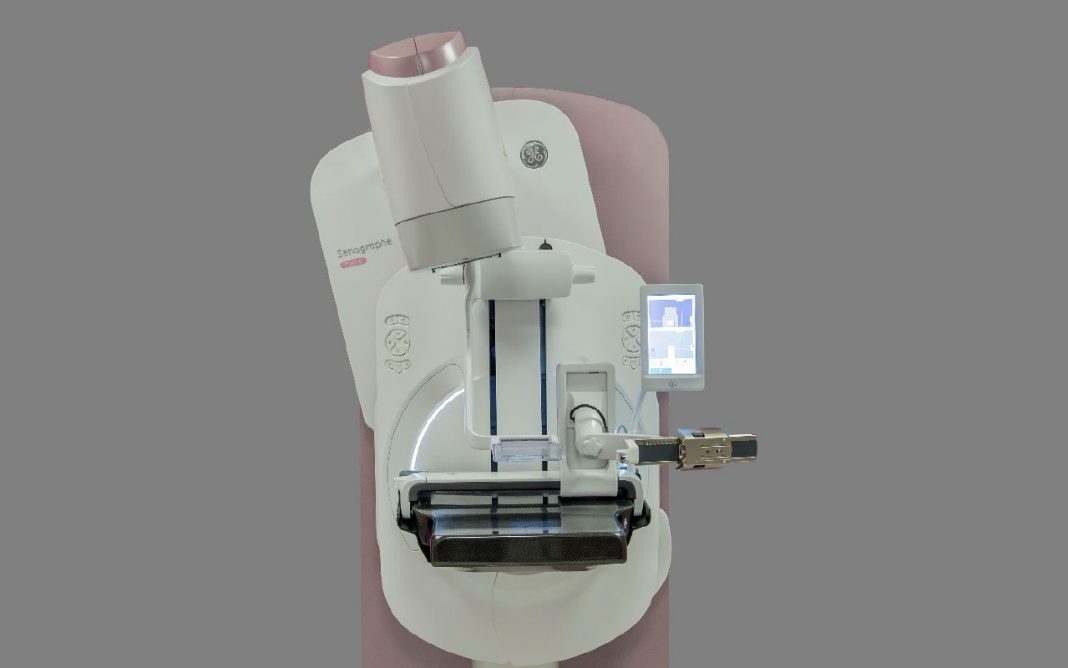Serena Bright, is now available in the United States. The news was announced today by GE Healthcare.
Serena Bright is the industry’s first contrast-enhanced guided biopsy solution and will help empower clinicians and patients in their fight against breast cancer. Receiving U.S. Food and Drug Administration 510(k) clearance in June, this technology allows clinicians to conduct breast biopsy exams with contrast guidance using the same mammography equipment, in the same room and with the same staff as the screening or diagnostic mammogram.
Typically, for lesions found with contrast-enhanced mammography and not seen on ultrasound, clinicians will use other imaging guidance, such as MRI, for biopsy procedures. Following an abnormal mammogram, it can take several weeks to get an MRI biopsy.1 As the backlog of cancer screenings caused by COVID-19 persists, delays in diagnosis will likely lead to presentation at more advanced stages and poorer clinical outcomes, with one study pointing to a potential increase of 33,890 excessive cancer deaths in the U.S. alone.2
Serena Bright may help decrease these delays, allowing follow-up biopsy procedures to be done in a matter of days, rather than waiting several weeks for MRI biopsy. When compared to MRI-biopsy guided therapy, the potential benefits of Contrast Enhanced Spectral Mammography (CESM) biopsy include shortened procedure time and improved overall patient experience.3,4
“In the current COVID-19 environment and requirements for shorter appointments to allow physical distancing, time has become our most precious asset,” said Dr. Anat Kornecki, Breast Imaging Lead, Breast Care Program, St. Joseph’s Health Care London and Scientist with Lawson Health Research Institute in London, Ontario. “This new mammography-guided biopsy technique is a gamechanger, and patients tell us it’s a very tolerable experience. It provides a familiar setting, familiar technology and a more comfortable option compared to MRI biopsies, which are longer and conducted with patients lying face down. Ultimately, this may help provide women with answers quickly.”
Key to this technology’s application is GE Healthcare’s SenoBright™ HD CESM, a diagnostic breast exam with iodine-based contrast that provides high sensitivity for more accurate breast cancer diagnosis.5 By highlighting areas of unusual blood flow to localize lesions that need to be biopsied, CESM biopsy – Serena Bright™ – provides excellent image quality to help improve clinical confidence.
“Now more than ever, it is critical we put the comfort of patients first and get them answers as fast as possible. We are proud to bring Serena Bright to our customers during a time when this type of innovation is needed most,” said Agnes Berzsenyi, President and CEO of Women’s Health and X-Ray at GE Healthcare. “We hope this technology can help improve breast cancer outcomes for women during this time of uncertainty.”
Health systems worldwide are looking to implement the Serena Bright technology in their fight against breast cancer, with Jefferson Health in Philadelphia being the first health care system in the United States to offer this technology in late 2020.
References
1 Jaiswal K, Hull M, Furniss AL, Doyle R, Gayou N, Bayliss E. Delays in Diagnosis and Treatment of Breast Cancer: A Safety-Net Population Profile. Journal of the National Comprehensive Cancer Network : JNCCN. 2018;16(12):1451-1457.
2 Lai A, Pasea L, Banerjee A, et al . Estimating excess mortality in people with cancer and multimorbidity in the COVID-19 emergency. medRxiv. Preprint posted online June 1, 2020. doi:10.13140/RG.2.2.34254.82242
3 Data on file 2020 GE Healthcare; From first to last image.
4 Accessed on 10/16/2020: https://www.cedars-sinai.edu/Patients/Programs-and-Services/Imaging-Center/For-Patients/Exams-by-Procedure/MRI/MR-Guided-Breast-Biopsy/MR-Guided-Breast-Needle-Core-Biopsy-Procedure-Information.aspx
5 Daniauxet al. Arch Gynecol Obstet , 2015



